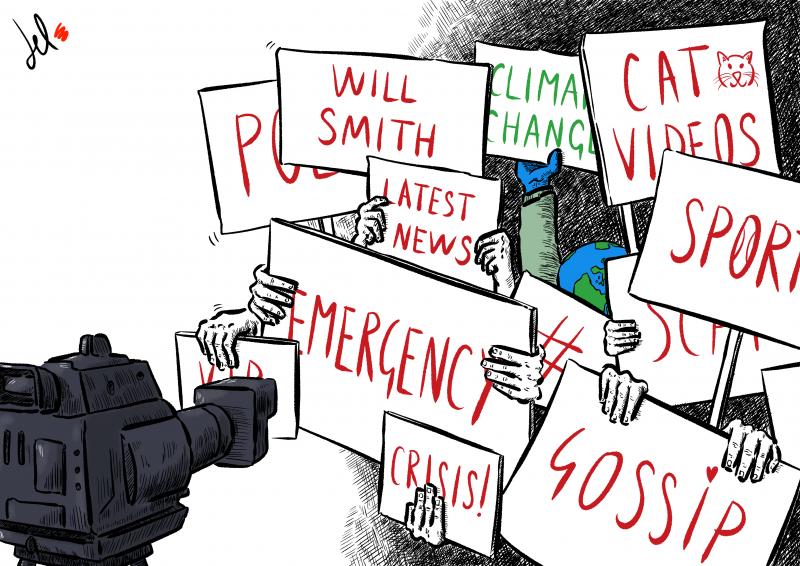At Voxeurop we are convinced that media coverage of the climate crisis is crucial to public understanding of the issue, and that it needs to be improved. This fact was emphasised by the International Panel on Climate Change (IPCC) in its sixth and latest assessment report. Accordingly, we give climate a prominent place in our pages, covering the impact on the lives of Europeans along with possible solutions.
It is therefore only natural that we have signed the Charter for a Journalism Fit for the Ecological Emergency (see below), which was drawn up by a group of journalists of diverse backgrounds. By translating it, we want to help spread the word in Europe.
The charter commits us to reflect more deeply on our own journalistic practices, and on our handling of this vital subject. In particular, it demands that we cover the issues in a fully cross-cutting manner, and make this complex subject as accessible to as many people as possible.
Charter for a Journalism Fit for the Ecological Emergency
The scientific consensus is clear: the climate and biodiversity are both in crisis, and humans are to blame. The impact on ecosystems and people will be global and, in some cases, irreversible. Limits are being reached and exceeded one after the other, and half of the world’s population is already highly vulnerable.
Interesting article?
It was made possible by Voxeurop’s community. High-quality reporting and translation comes at a cost. To continue producing independent journalism, we need your support.
In its sixth report, the Intergovernmental Panel on Climate Change (IPCC) emphasizes the crucial role the media must play in informing people about climate change.
It is up to journalists across the planet to rise to the challenge posed by extreme weather events for current and future generations. Faced with this genuine emergency, we journalists must raise our game in order to fully cover the issues – and thus to make clear what’s at stake for all of us.
That is the purpose of this charter. We therefore encourage all journalists and media outlets to:
- Cover all stories related to climate, living beings and social justice in an interdisciplinary manner, since they are intricately intertwined. Ecology can no longer be limited to a separate column; it must become a prism through which stories are critically examined.
- Take an educational approach. Scientific data is often complex. We must explain orders of magnitude and timescales, help identify causal links, and provide elements of comparison.
- Reflect on wording and images used. Carefully choosing words and pictures is crucial so as to accurately describe the facts and convey the urgency. We must avoid representations that may distort reality by understating the seriousness of the situation.
- Widen the scope of coverage. Refrain from solely calling on individuals to take responsibility and action, and instead consider upheavals as a systemic problem requiring political responses.
- Investigate the causes of the current events. Question our growth model; weigh up the role of economic and political actors in the ecological crisis. Remember that a purely short-term focus may prove disastrously detrimental to humanity and nature.
- Guarantee transparency. Mistrust of the mainstream media, entangled with the spread of misinformation, compels us to carefully review all data and quotes from experts. We must always show our sources and be transparent about potential conflicts of interest.
- Expose the strategies employed to plant seeds of doubt in the public’s mind. Lobbies are actively working to misinform and to undermine the public’s understanding of issues, thereby hindering action to address the crisis.
- Inform on actual solutions. Thoroughly investigate ways to act in favour of the climate, nature and human beings, whether on a small or large scale. Cross-examine the solutions proposed.
- Demand lifelong training. In order to grasp the bigger picture as well as the detailed effects of climate change on our societies, journalists must be provided with vocational training throughout their careers. Such a right is paramount to ensuring quality of coverage.
- Oppose funding that derives from the most polluting activities. To ensure editorial coherence in coverage of climate issues, journalists must have the right to express their concerns or disapproval of financing, advertising and/or media partnerships when these are linked to businesses they deem harmful.
- Strengthen media independence. Editiorial decisions must be completely independent from media owners’ interests.
- Gear up for “low carbon” journalism. Lower the carbon footprint of journalists’ work. Use more environmentally-friendly tools and practices, without skimping on necessary fieldwork. Encourage newsrooms to rely on local journalists whenever possible.
- Boost media cooperation. Take part in a united media ecosystem and promote a new journalistic ethic of helping preserve living conditions on Earth.












